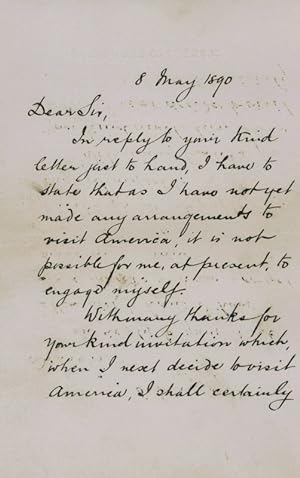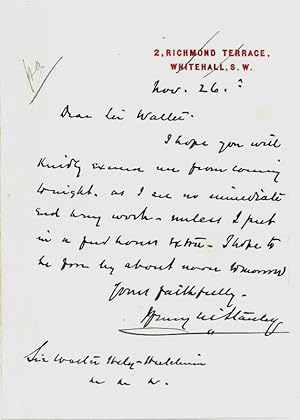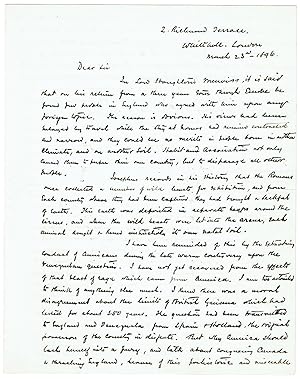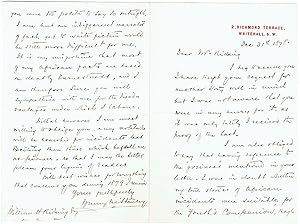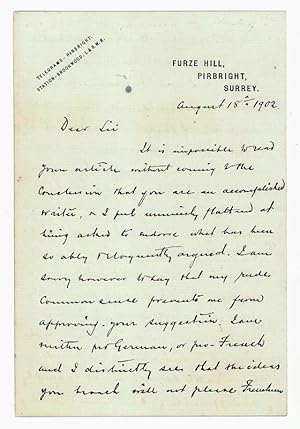stanley henry morton african explorer (7 risultati)
Tipo di articolo
- Tutti gli articoli
- Libri
- Riviste e Giornali
- Fumetti
- Spartiti
- Arte, Stampe e Poster
- Fotografie
- Mappe
-
Manoscritti e
Collezionismo cartaceo (7)
Condizioni
- Tutte
- Nuovi
- Antichi o usati
Legatura
- Tutte
- Rilegato (2)
- Brossura
Ulteriori caratteristiche
- Prima edizione
- Copia autografata (1)
- Sovraccoperta
- Con foto (5)
- No print on demand
Paese del venditore
Valutazione venditore
-
Clipped signature.
Editore: N. p. o. d.
Da: Antiquariat INLIBRIS Gilhofer Nfg. GmbH, Vienna, A, Austria
Manoscritto / Collezionismo cartaceo
60:113 mm. Mounted on a sheet of paper. "Yours very sincerely | Henry M Stanley".
-
Album leaf signed.
Editore: Paris, 28. VIII. 1891., 1891
Da: Antiquariat INLIBRIS Gilhofer Nfg. GmbH, Vienna, A, Austria
Manoscritto / Collezionismo cartaceo Copia autografata
8vo. 1 page. Mounted on a sheet of paper. The reverse has an autograph quotation signed by the French novelist Georges Ohnet (1848-1918).
-
Autograph letter signed.
Editore: [London], 8 May 1890., 1890
Da: Antiquariat INLIBRIS Gilhofer Nfg. GmbH, Vienna, A, Austria
Manoscritto / Collezionismo cartaceo
8vo. 1½ pp. on bifolium. J. C. Andrews, responding to an invitation to visit America: "In reply to your kind letter just to hand, I have to state that as I have not yet made any arrangements to visit America, it is not possible for me, at present, to engage myself [.]". - On stationery with embossed letterhead; letter good, envelope worn.
-
Autograph letter signed.
Editore: [London], November 26, no year.
Da: Antiquariat INLIBRIS Gilhofer Nfg. GmbH, Vienna, A, Austria
Manoscritto / Collezionismo cartaceo
8vo. 1 p. To Sir Walter: "I hope you will kindly excuse me from coming tonight as I see no immediate end to my work - unless I put in a few hours extra. I hope to be free by about noon tomorrow [.]". - The Anglo-Irish diplomat and colonial administrator Sir Walter Francis Hely-Hutchinson (1849-1913) served as Governor and Commander-in-Chief of Natal and Zululand (1893 to 1901) and as Governor of the Cape Colony (1901ff.). - On paper with embossed address; reverse with traces of mounting.
-
Autograph Letter Signed "Henry M. Stanley".
Editore: London, March 23, 1896, 1896
Da: Kotte Autographs GmbH, Roßhaupten, Germania
Manoscritto / Collezionismo cartaceo
ALS. 2pp. 4to. An unusually lengthy and fascinating letter by Henry M. Stanley (1841-1904), Welshborn,Anglo-American journalist and explorer, to Boston-based magazine and newspaper editor, William V. Alexander (1859-1938). The letter reads as follows:"In Lord Houghton s Memoirs, it is said that on his return from a three year tour through Europe he found few people in England who agreed with him upon any foreign topic. The reason is obvious. His views had been enlarged by travel while the stay at homes had remained contracted and narrow, and they could see no merits in people born in another climate, and on another soil. Habit and association not only caused them to prefer their own country, but to disparage all other people.Josephus records in his History that the Romans once collected a number of wild beasts for exhibition, and from each country where they had been captured they had brought a sackful of earth. This earth was deposited in separate heaps around the circus, and when the wild beasts were let into the arena, each animal sought and knew instinctively its own natal soil.I have been reminded of this by the extraordinary conduct of Americans during the late warm controversy upon the Venezuelan question.I have not yet recovered from the effects of that blast of rage which came from America. I am too astonished to think of anything else much. I knew there was a moral disagreement about the limits of British Guiana which had lasted for about 250 years. The question had been transmitted to England and Venezuela from Spain & Holland, the original possessors of the country in dispute. But why America should lash herself into a fury and talk about conquering Canada & thrashing England, because of this prehistoric and miserable squabble is more than I can understand. According to instinct and nature it sounds to me that Americans should have preferred Canadian soil to anything that was in South America, and English blood to Venezuelan, but no, Americans were said to be burning with a desire to lay Canada in waste, and destroy a people allied to them by blood, language habits, connections, & institutions, because the Venezuelans differed with the English, about the limits of an uninhabited, and uninhabitable patch of swamp land near the Orinoco. There are more churches and fewer illiterates in the United States than in any other country, yet with all its education and Christianity we have this mad fury as the result. An American General General Longstreet 76 years old praying in public for a war with Great Britain can find applause from his countrymen, because it is patriotic! Well if American soil had been trespassed upon, or anything American had been violated, njured, or insulted I could understand why resentment should have been shown, but why anything connected with Venezuela should be so dear to the American heart as to make Americans hate a sister country passes my comprehension. We cannot get up any anger about this matter in this country. We are absolutelyunconcerned about it though in Society we are still discussing the convulsion inAmerica, and wondering what strange influence it was that made a whole nation of 72million act as though it had been stricken with madness. And now that you have satdown quietly in Commission to unravel the historical puzzle, we all feel more thanCommonly grateful to you, and we hope that you will arrive at a just solution of it.Now considering that the Boston Press Club has been incorporated for the purpose ofSocial intercourse, and friendly feeling among its numbers, is it too much to hope thatthey may become animated with a desire to enlarge this sphere of influence, andinclude British humanity among those deserving of their friendly regards? In this hopeI rest "A Welsh immigrant to the United States who enlisted in the Confederate Army (he subsequently fought for the Union) and later became a war correspondent, Stanley was sent by the New York Herald in 1868 to accompany British forces fighting against Emperor Theodore of Abyssinia. His scoop about the fall of Magdala brought him immediate recognition and the offer of further Herald assignments, the most famous being his successful search and discovery, three years later, for Scottish missionary and explorer David Livingstone. Upon his discovery in a remote area of Tanzania in 1871, Stanley famously greeted him with, "Dr. Livingstone, I presume?"This letter regards the Venezuelan Crisis of 1895, a territorial dispute between Britain and Venezuela over Essequibo and Guayana Esequiba, which Britain claimed were part of British Guiana. The dispute dated back to the time of Spanish colonization but became a diplomatic crisis in 1895, when America s ambassador to Venezuela argued that Britain s claims and, in particular, its occupation of Nicaragua s port of Corinto on April 22, 1895, violated the 1823 Monroe Doctrine. American President Grover Cleveland demanded international arbitration which led to a conference in Paris in 1898 and a settlement in 1899 that determined the bulk of the disputed territory to belong to British Guiana. The incident helped improve the United States standing in South America, while raising its prominence in matters of international importance. Confederate General James Longstreet (1821-1904) whom his superior officer, Robert E. Lee, called "Old War Horse," was involved in post-bellum Republican politics, serving as ambassador to the Ottoman Empire and U.S. Commissioner of Railroads.Alexander, the letter s recipient, was a journalist who served as managing editor of the Ladies Home Journal from 1898 until 1910. He was also the president of the Boston Press Club, discussed in the letter, and the vice-president of the International League of Press Clubs.English poet and politician Richard Monckton Milnes, 1st Baron Houghton (1809-1885) was a Member of Parliament who Lord Palmerston had elevated to a peerage. As a respected Author, he exerted great influence in literar.
-
Autograph letter signed.
Editore: Richmond Terrace, Whitehall, S.W., 31. XII. 1898., 1898
Da: Kotte Autographs GmbH, Roßhaupten, Germania
Manoscritto / Collezionismo cartaceo
8vo. 2 pp. Double sheet. Printed letterhead. A fascinating letter by Henry M. Stanley (1841-1904) to American Author and journalist, William Henry Rideing (1853-1918), concerning his African adventure stories and fiction writing."Dear Mr. Rideing, I beg to assure you that I have kept your request for another story well in mind but Iwas not aware that you were in any hurry for it, as it was only lately I received the proof of the last. I am also obliged to say that having reference to the "goriness" mentioned in your letter - I was in doubt whether my true stories of African incidents were suitable for the "Youth s Companion", though you were too polite to say so outright.I am but an indifferent narrator of fact yet to write fiction would be still more difficult for me. It is my misfortune that most of my African facts are based on deadly earnestness, and I am therefore sure you will sympathise with me for the disadvantages under which I labour. Withal however I am most willing to oblige you. My notebooks will be searched for incidents less exciting than those which befell me as a pioneer - so that I may the better please your legions of readers. With best wishes for everything that concerns you during 1899. [ ]"A Welsh immigrant to the United States who enlisted in the Confederate Army (he subsequently fought for the Union) and later became a war correspondent, Stanley was sent by the New York Herald in 1868 to accompany British forces fighting against Emperor Theodore of Abyssinia. His scoop about the fall of Magdala brought him immediate recognition and the offer of further Herald assignments, the most famous being his successful search and discovery, three years later, for Scottish missionary and explorer David Livingstone. Upon his discovery in a remote area of Tanzania in 1871, Stanley famously greeted him with, "Dr. Livingstone, I presume?" William Henry Rideing wrote for the New York Tribune, the New York Times, the Springfield Republican, the Boston Journal and Harper's Weekly. He also authored 12 works of fiction and non-fiction for both adults and children on subjects including travel,history and adventure. Rideing travelled extensively around Europe to obtain material to write about. From 1881 until his death, Rideing was the Associate Editor of The Youth's Companion magazine (1827 1929). For most of its history, The Youth's Companion was a children s magazine. In the 1890s, after Rideing was made the Associate Editor, the magazine began to write for both adults and children. The magazine had numerous important contributors such as: Ernest Shackleton, WinstonChurchill, Mark Twain, Jack London, Harriet Beecher Stowe, Emily Dickinson and Booker T. Washington.This letter was previously owned by Esmond Bradley Martin (1941-2018) who over a thirty year period put together one of the greatest collections on Africa and its history. Martin was educated as a geographer and philosopher, and lived a large portion of his life in Africa. He wrote extensively, sometimes in collaboration with his wife, on African history and conservation. For a period, he was a United Nations special envoy for rhino conservation. He continued this work until 2018, when tragically he was murdered in his Nairobi home.Accompanied with Sotheby s typed transcriptions from the original sale of the item in 1977. Lengthy letters by Stanley with such interesting content are rare to acquire.
-
Autograph letter signed.
Editore: Pirbright, Surrey, 18. VIII. 1902., 1902
Da: Antiquariat INLIBRIS Gilhofer Nfg. GmbH, Vienna, A, Austria
Manoscritto / Collezionismo cartaceo
8vo. 3 pp. on 3 ff. A sharp letter revealing Stanley's sensitivity to cultures other than his own and his desire to impart this on others. To Robert Stein, criticizing his correspondent's remarks about the French, Germans, Americans and the English: "It is impossible to read your article without coming to the conclusion that you are an accomplished writer, & I feel immensely flattered at being asked to endorse what has been so ably & eloquently argued. I am sorry however to say that my rude common sense prevents me from approving your suggestion. I am neither pro-German, or pro-French and I distinctly see that the ideas you broach will not please Frenchmen nor indeed any American or Englishman who is of clean unbiassed mind, & I doubt, whether the higher class of Germans will regard them as wise. I cannot divest my mind quite from the suspicion that there is some irony concealed in your proposals, & if I were a Frenchman I feel I should be furiously angry. You may be innocent of all intention to provoke Frenchmen, but it is too evident your exaggerated ideas of German[y] might border perilously near being offensive. If America talked of American projects with such exaggerated insinuation of her power, & her wealth &c, she would be simply insufferable, & no lover of Germany would care to put ideas in her mouth which would estrange the good will of every nation. Germany is too rich & powerful to need such language to impress her greatness & her value as one of the foremost among the nations. As yet she feels the need of more land, but if out of inordinate conceit she proclaims her greedy love of it & wantonly promotes discord to indulge it, she will end in making herself as detested as the French did previous to 1870-71 [.]". - On his imprinted stationery; very scattered spotting.



